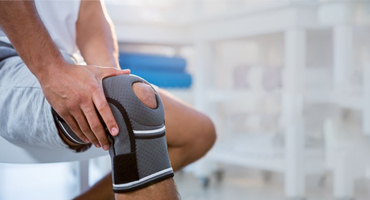
ACL Tear
ACL Tear Symptoms & How To Recover
A torn anterior cruciate ligament (ACL) is the most common and painful of sports injuries. It’s common because almost all sports ACTIVITY(soccer, football, basketball, skiing, etc.) involve cutting, pivoting, and extension of the legs during the sport.
How ACL Tears Happen
Most ACL tears occur as a result of twisting, hyperextending the leg, or pivoting – common moves in sports, especially football, badminton, basketball, soccer, tennis, and skiing. ACL prevents external rotation of femur over tibia so when the force of rotation of the femur is more than the tensile strength of all it leads to an ACL tear. Interestingly enough, women experience ACL tears more often than men, possibly due to estrogen levels making their joints looser. Therefore, younger women and girls are at greater risk for ACL tears; however, women of all ages tend to have weaker quadriceps (muscle) and less control over their knees than men. In addition, the anatomy and muscle function of the knee is different in women than in men thereby resulting in a tendency for women to have more knee injuries.
Symptoms And Signs Of A Torn ACL
- At the moment of injury, you may hear a popping sound: You may also feel a pop when the ACL tears. It is a very distinct sound and feels.
- The very sudden and intense onset of pain: Most athletes report feeling a searing, burning, or intense pain immediately after the popping sound.
- Swelling in the affected knee within the first five to six hours: The swelling is brought on by blood and fluids from the tear flowing in and around the injured area.
- Can’t straighten or bend the knee all the way and the knee feels tight: Strains or sprains of the ACL may lead to a feeling that the knee is unstable or the knee may actually give way when you try weight bearing.
- When the tear is more than a few weeks: Pain is not a prominent symptom but feelings of instability and lack of confidence in running and sports activity are important complaints.
Recovering From An ACL Tear
Most people who do not see a specialist right away resume their lives once the swelling from an ACL tear subsides. After a few weeks of rest, ice and painkillers, the knee will begin to feel normal and most people assume it has healed, but that is quite the opposite.
Unlike torn muscles, a completely torn ACL does not heal by itself. Just because the knee feels better in a week or two doesn’t mean it is better. Before returning to any sports or physical activity, the knee should be checked. If the ACL is torn and nothing is done about it, returning to playing sports can cause re-injury to the knee. If the knee buckles a second time, there is a risk of tearing the meniscus and causing damage to the cartilage in the knee, thus making the injury even worse.
Successful recovery of an ACL tear after reconstruction can take up to a year. It’s important that during this time you find a sports injury specialist to assist in your recovery. Even if you do not plan to return to a particular sport, it’s important that a physician addresses your ACL tear.

